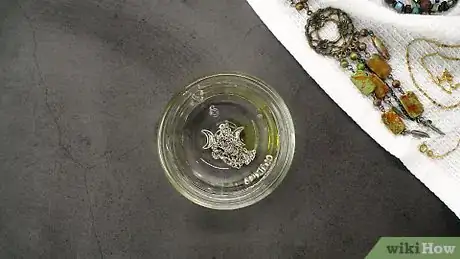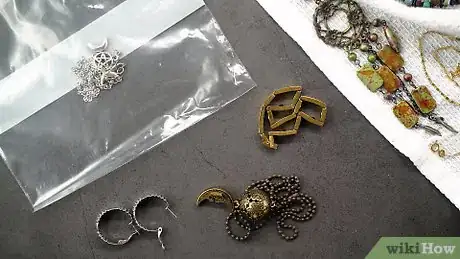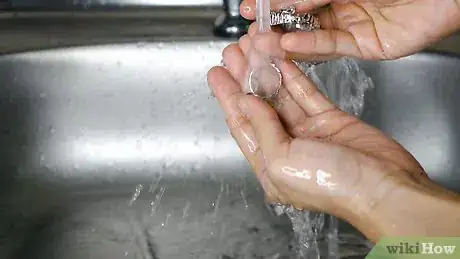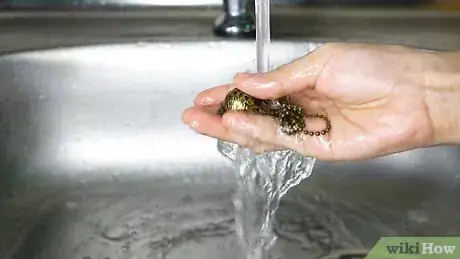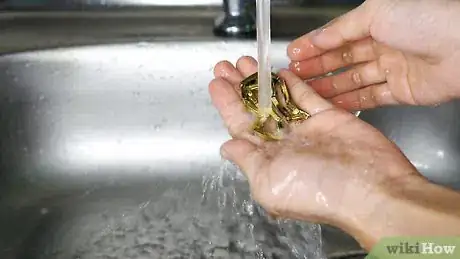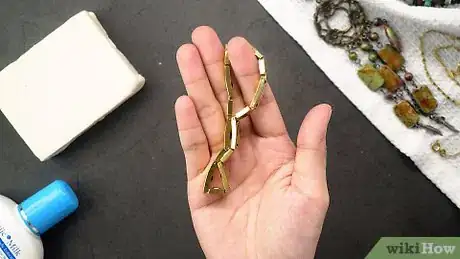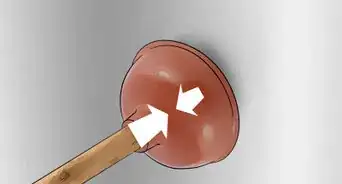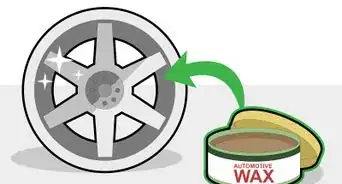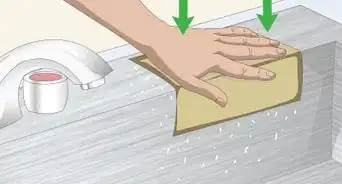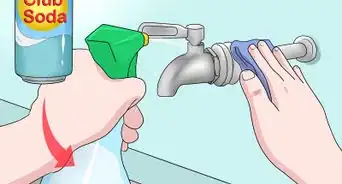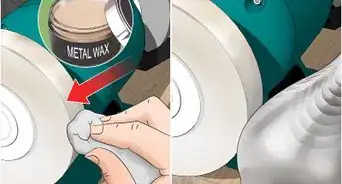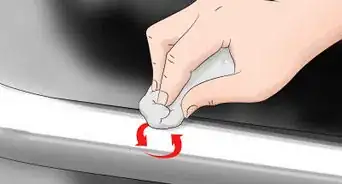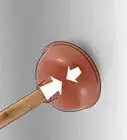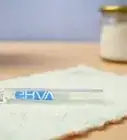This article was co-authored by Kennon Young. Kennon Young is a Master Gemologist Appraiser and the Owner of Vermont Gemological Laboratory in Burlington, Vermont. With over 20 years of experience in the industry, Kennon and his team specialize in handmade engagement rings, wedding bands, and custom jewelry. He attended the Revere Academy of Jewelry Arts, the Gemological Institute of America, and the Rhode Island School of Design Extension. He is a Jewelers of America (JA) Certified Bench Jeweler Technician and received the highest credential in the jewelry appraisal industry, the ASA Master Gemologist Appraiser, in 2016.
There are 15 references cited in this article, which can be found at the bottom of the page.
This article has been viewed 33,322 times.
Metal jewelry can get tarnished, dull, and dirty after weeks of wear or storage. When it gets dirty, clean your jewelry right in your home using simple household products. Whether you are cleaning stainless steel, costume jewelry, silver, or even gold, cleaning a piece of jewelry is an easy process you can complete in under 10 minutes.
Steps
Cleaning Stainless Steel Jewelry
-
1Soak your stainless steel in soapy water and rub it clean. Fill a bowl with warm water and add a few drops of mild, liquid soap. Soak your jewelry for a few minutes, and then rub it with a soft cloth, not a paper tissue. If your jewelry has grooves or engravings, use a soft toothbrush to clean all the detailing.[1]
-
2Wash with baking soda, water, and a soft toothbrush if it’s still dirty. First mix a little bit of baking soda and water together to make a paste—the exact proportions don’t matter. Gently rub the jewelry with the paste.[2]
- You can also use a simple toothpaste that doesn’t contain silica or whitening agents.
Advertisement -
3Rinse in warm water and dry with a lint-free cloth. Rinse it with warm water until all the soap or paste is gone. Wipe the jewelry down thoroughly with a dry, soft cloth, taking care to ensure there are no water droplets left on your jewelry.[3]
-
4Store stainless steel jewelry separately from other metals. Even though it doesn’t tarnish as easily as silver, it can still get scratched. It’s best to keep your jewelry in individual plastic bags or fabric pouches. Even if you are storing earrings, it’s best to keep each one in its own little bag.[4]
Polishing Silver Jewelry
-
1Soak your silver to remove dirt or oil. Prepare a solution of warm water and a few drops of ammonia- and phosphate-free dish soap in a bowl. Soak your silver in the bowl for a minute, then remove and dry with a soft cotton cloth. If there are stubborn dirt spots remaining, brush them gently using a soft, baby toothbrush.[5]
- If you want to clean a diamond ring, it won’t hurt the diamond to soak it.
- If your silver is tarnished as well as dirty, move on to polishing it.
-
2Rub your silver with a dry microfiber cloth to remove tarnish. You can use a silver cloth, lint-free flannel, or another soft cloth, but not a paper tissue. Rub in long motions, rather than little circles. Often just the act of rubbing the silver will remove the tarnish.[6]
- As your polishing cloth darkens, move it so you are rubbing with a clean section of the cloth.
-
3Polish your silver with home-made silver cleaner if it’s still tarnished. Line the bottom of a glass baking dish with aluminum foil. Fill the container with about a cup of steaming hot water. Add about 1 tablespoon of baking soda and 1 tablespoon of salt. Wait until all the baking soda and salt is dissolved, then drop the silver in.[7]
- You should see the mixture bubbling after you but the silver in, which shows the reaction’s working.[8]
- Turn the jewelry over after a few minutes so the other side touches the aluminum.
-
4Remove tarnish with a store-bought silver polish as a last resort. Wear gloves and be sure to follow the instructions on the polish. If you’re using a silver dip, quickly dip the silver in. If using a paste, rub it on with a cloth using straight line motions. [9]
- Take care when polishing silver-plated jewelry, because you don’t want to wear through the plating.
- Be careful if there are gemstones, because the polish might remove a gem’s protective coating.[10]
-
5Rinse and dry your jewelry. Whether you’ve cleaned your silver with soapy water, homemade silver cleaner, or polish, you should thoroughly rinse your silver after cleaning it. Then, dry the silver with a clean, soft cloth, rather than a paper tissue or towel.[11]
-
6Store your silver in individual, air-tight bags to prevent future tarnish. You can keep the jewelry in plastic bags, but a tarnish-resistant flannel bag will work even better. Don’t put more than one piece of silver jewelry in the same bag, because they might tangle and scratch each other.[12]
- You can also throw a silica gel packet into each bag for extra protection.
Cleaning Costume Jewelry
-
1Brush your costume jewelry with a mixture of baby shampoo and water. Use a microfiber cloth (like the kind used for cleaning eyeglasses) or a soft, new toothbrush. Rub very gently, because you don’t want to rub through the plating. Carefully remove the verdigris, the green plaque that builds up on costume jewelry.[13]
- Jewelry cleansers are too harsh for costume jewelry, so it’s best to stick to gentle detergents like baby shampoo.
-
2Rinse the jewelry quickly in cool water. The fake gems in costume jewelry are normally glued on, so if you keep the piece wet for too long, the water will loosen the glue. If there are rhinestone on your jewelry, soaking them might remove the foil that keeps the rhinestones shiny.[14]
-
3Dry with a towel or a cool blow dryer. Dry the piece immediately after rinsing with a soft, clean cloth. You can use a blow dryer on a cool setting to make sure it’s totally dry. If you use a warm setting, the glue holding the gems might melt of the jewelry might warp.[15]
- Keeping your costume jewelry dry will help it last much longer, so take it off before swimming or bathing.
Washing Gold Jewelry
-
1Soak the gold in a soapy water solution for 1 minute. Fill a bowl with warm water and a few drops of liquid soap. Make this solution in a bowl, rather than the sink, so you don’t risk losing anything down the drain.[16]
- If you’re cleaning a small piece of jewelry, you may want to put it in a strainer before submerging it, so you can easily take it out again.
- If you’re cleaning a diamond ring, you may want to soak for 20 minutes.[17]
-
2Lay the gold jewelry on a soft cloth and clean with a soft toothbrush. Use a soft, new toothbrush and work the bristles into any little crevices on your jewelry. A toothbrush will be able to reach places that you can’t clean simply with your hands.[18]
- A toothbrush made for babies is a good option, because they tend to be softer.
- Don’t use a toothbrush that’s been previously used for brushing teeth!
-
3Soak the gold in an ammonia solution if it’s still dirty. Add six parts water and one part ammonia to a bowl. You only need enough of this solution so that your gold can totally submerge. Put the gold in the bowl, and soak it for up to a minute.[19]
- Don’t leave it too long, because the ammonia can damage the gold.
-
4Rinse the jewelry under running water and dry it with a soft cloth. Don’t dry your gold jewelry with paper towels or tissues. Instead, use a soft cotton cloth or a microfiber cloth, like the kind you would use to clean eyeglasses.[20]
- Don’t leave drops of water, because they can make the jewelry tarnish quicker.
-
5Keep your gold clean by keeping it away from lotion, chlorine, and soap. Take off gold jewelry before you take a bath or go for a swim. Before using household cleaners, you should remove any gold jewelry on your hands, or wear gloves over the jewelry.[21]
- Remember, gold is a soft metal that scratches easily, so don’t let it rub up against other metals.
Expert Q&A
Did you know you can get expert answers for this article?
Unlock expert answers by supporting wikiHow
-
QuestionHow do you clean fragile jewelry?
 Kennon YoungKennon Young is a Master Gemologist Appraiser and the Owner of Vermont Gemological Laboratory in Burlington, Vermont. With over 20 years of experience in the industry, Kennon and his team specialize in handmade engagement rings, wedding bands, and custom jewelry. He attended the Revere Academy of Jewelry Arts, the Gemological Institute of America, and the Rhode Island School of Design Extension. He is a Jewelers of America (JA) Certified Bench Jeweler Technician and received the highest credential in the jewelry appraisal industry, the ASA Master Gemologist Appraiser, in 2016.
Kennon YoungKennon Young is a Master Gemologist Appraiser and the Owner of Vermont Gemological Laboratory in Burlington, Vermont. With over 20 years of experience in the industry, Kennon and his team specialize in handmade engagement rings, wedding bands, and custom jewelry. He attended the Revere Academy of Jewelry Arts, the Gemological Institute of America, and the Rhode Island School of Design Extension. He is a Jewelers of America (JA) Certified Bench Jeweler Technician and received the highest credential in the jewelry appraisal industry, the ASA Master Gemologist Appraiser, in 2016.
Master Gemologist Appraiser
-
QuestionWhat is the worst thing to clean metal jewelry with?
 Kennon YoungKennon Young is a Master Gemologist Appraiser and the Owner of Vermont Gemological Laboratory in Burlington, Vermont. With over 20 years of experience in the industry, Kennon and his team specialize in handmade engagement rings, wedding bands, and custom jewelry. He attended the Revere Academy of Jewelry Arts, the Gemological Institute of America, and the Rhode Island School of Design Extension. He is a Jewelers of America (JA) Certified Bench Jeweler Technician and received the highest credential in the jewelry appraisal industry, the ASA Master Gemologist Appraiser, in 2016.
Kennon YoungKennon Young is a Master Gemologist Appraiser and the Owner of Vermont Gemological Laboratory in Burlington, Vermont. With over 20 years of experience in the industry, Kennon and his team specialize in handmade engagement rings, wedding bands, and custom jewelry. He attended the Revere Academy of Jewelry Arts, the Gemological Institute of America, and the Rhode Island School of Design Extension. He is a Jewelers of America (JA) Certified Bench Jeweler Technician and received the highest credential in the jewelry appraisal industry, the ASA Master Gemologist Appraiser, in 2016.
Master Gemologist Appraiser
-
QuestionWill vinegar clean jewelry?
 Kennon YoungKennon Young is a Master Gemologist Appraiser and the Owner of Vermont Gemological Laboratory in Burlington, Vermont. With over 20 years of experience in the industry, Kennon and his team specialize in handmade engagement rings, wedding bands, and custom jewelry. He attended the Revere Academy of Jewelry Arts, the Gemological Institute of America, and the Rhode Island School of Design Extension. He is a Jewelers of America (JA) Certified Bench Jeweler Technician and received the highest credential in the jewelry appraisal industry, the ASA Master Gemologist Appraiser, in 2016.
Kennon YoungKennon Young is a Master Gemologist Appraiser and the Owner of Vermont Gemological Laboratory in Burlington, Vermont. With over 20 years of experience in the industry, Kennon and his team specialize in handmade engagement rings, wedding bands, and custom jewelry. He attended the Revere Academy of Jewelry Arts, the Gemological Institute of America, and the Rhode Island School of Design Extension. He is a Jewelers of America (JA) Certified Bench Jeweler Technician and received the highest credential in the jewelry appraisal industry, the ASA Master Gemologist Appraiser, in 2016.
Master Gemologist Appraiser
Warnings
- Never use silver polish on gold jewelry.⧼thumbs_response⧽
References
- ↑ Kennon Young. Certified Jeweler. Expert Interview. 11 September 2019.
- ↑ https://www.findurings.com/blog/How-to-Clean-Stainless-Steel-Jewelry/
- ↑ https://www.sincerelysilver.co/blogs/jewelry-blog/how-to-clean-stainless-steel-jewelry
- ↑ https://www.jewelrynotes.com/how-to-care-for-stainless-steel-jewelry/
- ↑ https://www.novica.com/blog/how-to-clean-and-care-for-sterling-silver-jewelry/
- ↑ https://www.novica.com/blog/how-to-clean-and-care-for-sterling-silver-jewelry/
- ↑ https://www.wired.com/2012/07/silver-jewelry-chemistry/
- ↑ https://www.wired.com/2012/07/silver-jewelry-chemistry/
- ↑ http://www.howtocleanstuff.net/how-to-clean-silver-jewelry/
- ↑ http://www.howtocleanstuff.net/how-to-clean-silver-jewelry/
- ↑ https://newengland.com/today/living/cleaning/homemade-silver-cleaner/
- ↑ https://www.romadesignerjewelry.com/blogs/education/sterling-silver-care-5-tips-for-long-lasting-jewelry
- ↑ https://www.whowhatwear.com/cleaning-costume-jewelry/slide3
- ↑ https://cleanmyspace.com/how-to-clean-costume-jewelry/
- ↑ https://www.whowhatwear.com/cleaning-costume-jewelry/slide4
- ↑ http://www.howtocleanstuff.net/how-to-clean-gold/
- ↑ https://www.brides.com/story/how-to-clean-engagement-ring
- ↑ http://mentalfloss.com/article/85473/5-tips-cleaning-dirty-jewelry-even-5-necklace
- ↑ http://www.howtocleanstuff.net/how-to-clean-gold/
- ↑ http://www.howtocleanstuff.net/how-to-clean-gold/
- ↑ http://www.howtocleanstuff.net/how-to-clean-gold/
About This Article
To clean your metal costume jewelry, scrub the jewelry with a toothbrush and some baby shampoo mixed with water. Scrub gently and focus on areas where there is green plaque build-up. Rinse the jewelry off with cool water when you're finished, then immediately dry it with a towel. If you're jewelry is made out of stainless steel, soak it in soapy water, then rub it clean with a soft cloth. For stubborn grime, mix baking soda and water and scrub the paste into your jewelry with a toothbrush. To learn how to clean silver and gold jewelry, keep reading!
